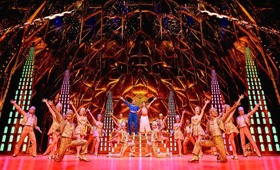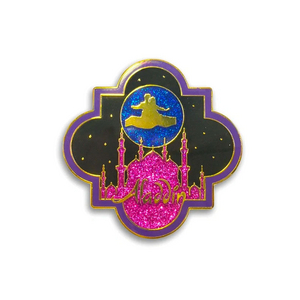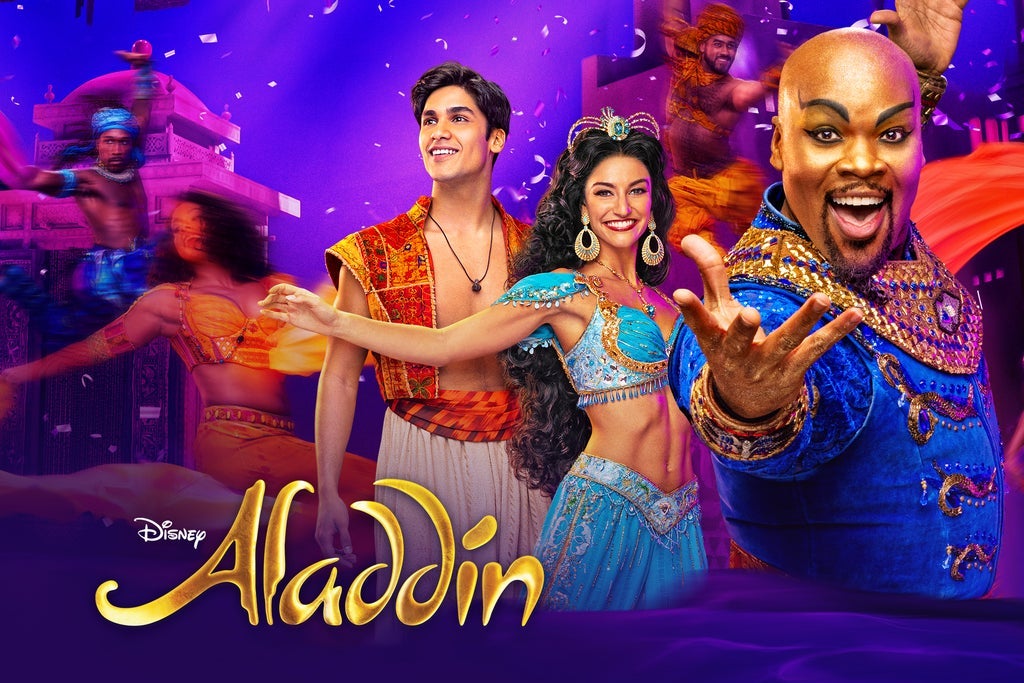Review: A Whole New World In Minato, Tokyo

Aladdin the 1992 Disney animated feature about a protagonist who strives to overcome great obstacles and fulfill a dream is the magic formula that drives most Hollywood blockbusters. For over 20 years this action-packed love story has delighted audiences with colorful fantasy and lofty fun, earning two Oscars, four Grammys including Alan Menken and Tim Rice's Song Of The Year "A Whole New World," and iconic melodies and vocal performances, most notably by the late, great Robin Williams who voiced the Genie.
The Broadway adaptation opened 22 years later on March 20th, 2014 and continues to gross over a million dollars a week at the New Amsterdam. But its roots go far deeper than this widely popular retelling of an ancient Arabic folk tale about a street urchin who falls in love with a princess. Most versions draw Middle Eastern references while some sources say Aladdin was Chinese and that the story took place in Asia. All the more appropriate that the first international production of Aladdin opened in Minato, Tokyo on May 24th, 2015 at Dentsu Shiki Theatre Umi with continued box office success
Billed as Aladdin: The Hit Broadway Musical, this was my first experience seeing an exact replica from New York mounted in another country. Branding at its best, the sets, costumes, lighting, and all of Casey Nicholaw's direction and choreography have been retained to mirror the precise aesthetic. And despite the language barrier, the Disney trademark delivers an electrifying escape with serious heart.
The Genie (Yoichiro Akutsu) opens the show with direct address to the audience, welcoming patrons on a magical ride to the fictional world of Agrabah. As he searches for his most treasured item, he pulls out a mini Kaminarimon's Dai-chochin (lantern) from Sensoji Temple and the audience devours the local reference. His search continues as he reveals the magic lamp, segueing into "Arabian Nights," a strong opening number featuring tight dancing, acrobatics, and shooting flames.
"One Jump Ahead" illustrates Aladdin's (Tetsuro Kasamatsu) great athleticism as he scales the set to escape authorities. He effortlessly jumps on trampolines, sings with great vocal stamina, and shifts through the maze of the marketplace. Occasionally, English words slip into the script to drive a point and in Kasamatsu's case, he screams "JUUUMP" as he leaps off a building. In a contemplative and earnest transition, Kasamatsu's "Proud Of Your Boy" establishes a dreamer who aspires to do right in the world.
The Sultan (Yoshito Ishinami), eager to marry off his daughter, Princess Jasmine (Kaho Sanpei), is disheartened to see her turn away yet another eligible suitor. The evil duo, Iago (Weiss Toma Yoshiga) and Jafar (Yuji Honjo), grimace downstage and proclaim "Game Over" (another comical English interjection). Confinement and strict regime keep the feisty Jasmine from finding a suitor on her own accord. Sanpei, sweet yet strong, laments the antiquated rules while she dreams of life beyond "These Palace Walls," in a new song added for the musical.
Meanwhile, a dark backdrop descends as Iago and Jafar plot to enter the Cave of Wonders. The two pursue the Genie's lamp in grim, green lighting and uncover that only the "diamond in the rough" may enter the cave. And who might that be? In an impressive moment of visual storytelling, an image floats up from the magic book and projects onto the scrim, revealing Aladdin.
To cut the tension, "5,6,7,8" leads into the up-tempo "Babkak, Omar, Aladdin, Kassim" as the plucky band of brothers entertain the market dwellers. Film fans may miss the loveable monkey, Abu who has been replaced by human companions for stage. The men (Mitsuyuki Fujita, Yoichiro Saito, Kasamatsu, and Takamasa Hagiwara) are light on their feet and dance well. Jasmine's escape in weak disguise requires some imagination on the audience's part as she lifts the hood of her cloak. Nicholaw's elaborate formations, weaving through the marketplace create a West Side Story homage akin to Tony and Maria in "Dance At The Gym." Time slows down, Aladdin and Jasmine's eyes meet, and it is love at first sight. The chorus dances joyfully as the lovers exit to Aladdin's hideout. Similarly feeling stuck, Aladdin and Jasmine muse over hopes of travel and a fresh start in the driving pop ballad "A Million Miles Away."
Honjo's Jafar in delectable villainous form seduces Aladdin in the tango number "Diamond In The Rough" accompanied by Iago's echoes. Eager to be reunited with Jasmine, Aladdin takes the bait and lands at the mouth of the lair. "Who disturbs my slumber?" growls the menacing Cave with piercing green eyes. Determined and unafraid, Aladdin enters and awakens the Genie who, through an epic show-stopping musical number, grants him the opportunity of a lifetime.
"Friend Like Me," performed by the charming Akutsu, is zany and jaw dropping. There's gold. There's glitz. There's pyrotechnics with a never-ending feast of glitter, magic tricks, and dance segments that pay tribute to famous musical theater moments (the opening of A Chorus Line). Chad Beguelin's book allows Akutsu to play everything from literal to deadpan humor. When Aladdin asks about the Genie's habitat ("So you came from inside the lamp?") he responds with "No, I'm from Tokyo," another reference much appreciated by the crowd. And then there's the Disney mega mix with snippets from "Beauty And The Beast," "Part Of Your World," "Under The Sea," and "Colors Of The Wind." Nicholaw even hearkens the old-time era of 42nd Street with a rousing tap conclusion.
"Prince Ali" kicks the second act into gear with a full company production number and the ever-so-suave Genie who drives the parade. Akutsu, dressed like a Dapper Dan (by Gregg Barnes), delivers a jazzy vocal to introduce the new Aladdin. Ali, sporting his rich attire, approaches Jasmine and utters a phrase from their previous encounter: "Do you trust me?" She takes his hand and off they fly to "A Whole New World."
The magic carpet ride is brilliantly executed by Tait Towers, the engineering team behind the breathtaking illusion. Without a trace of strings or lifts, Aladdin and Jasmine fluidly soar through the night sky, beautifully lit by Natasha Katz. The stars adorn the duo while they sing in harmony and create pure Disney magic.
The trio (Mitsuyuki Fujita, Yoichiro Saito, and Takamasa Hagiwara), non-existent in the film, are highly featured in the stage adaptation and provide most of the comedic relief. In "High Adventure" they move towards the palace and at one point act in slow-motion, accompanied by a hilarious use of strobe light, while an upstage passer-by crosses in real time. They shoot each other a perplexed look and the audience delights in the chaos. Their antics land them in jail, Aladdin too, where they deliver a peppy "Somebody's Got Your Back," one of the many songs originally written for the movie but later cut from the feature. The Genie saves the day, yet again, and while Aladdin may be free, he is enslaved by his false persona. Jafar exposes him in front of the entire court but Aladdin retaliates against the villain, frees the Genie, and redeems himself. Aladdin confesses his true love to Jasmine and the Sultan proclaims that she can marry whomever she wishes.
Sanpei and Kasamatsu, both great movers, rejoice through song and dance. They, along with the cast, reinforce the universality of Disney's themes with the reprise of "A Whole New World." And for a brief moment I was transported to Times Square. Across oceans and worlds apart, the Shiki company production upholds the Broadway legacy.
_____________________________________________________________
Credits: Music by Alan Menken, lyrics Howard Ashman and Tim Rice, book and additional lyrics by Chad Beguelin, Directed and Choreographed by Casey Nicholaw, Associate Director Scott Taylor, Dance Captain Michael Mindlin
Review by Mara Jill Herman
Shiki Theater Consultant: Takuya Kubo
Broadway Consultant: Lauryn Ciardullo
Photo Credit: Takeshi Arai, ©Disney
For more information, visit Shiki https://www.shiki.jp
Reader Reviews



 Aladdin Logo Magnet
Aladdin Logo Magnet
